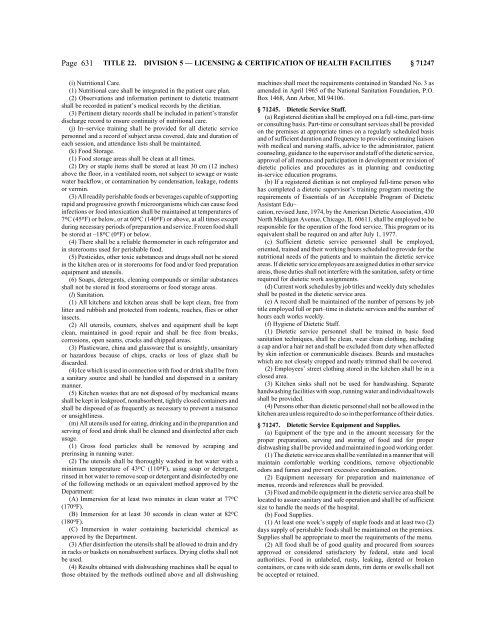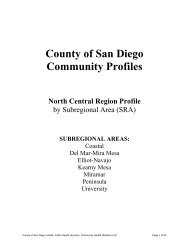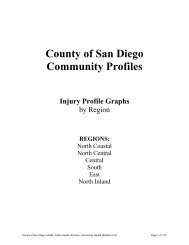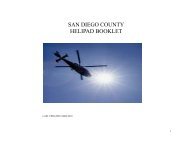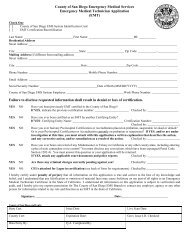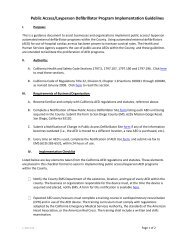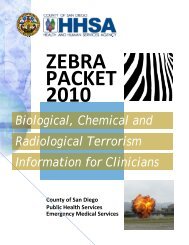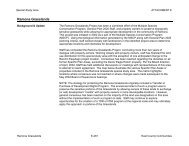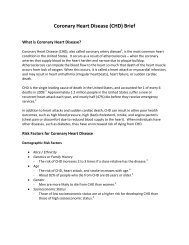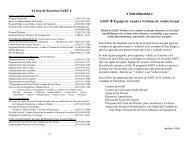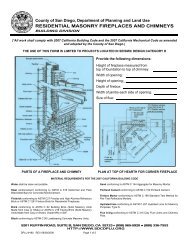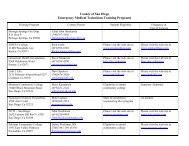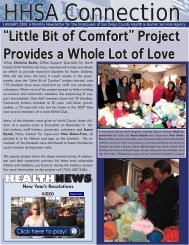CALIFORNIA CODE OF REGULATIONS - State of California
CALIFORNIA CODE OF REGULATIONS - State of California
CALIFORNIA CODE OF REGULATIONS - State of California
You also want an ePaper? Increase the reach of your titles
YUMPU automatically turns print PDFs into web optimized ePapers that Google loves.
Page 631<br />
TITLE 22. DIVISION 5 — LICENSING & CERTIFICATION <strong>OF</strong> HEALTH FACILITIES § 71247<br />
(i) Nutritional Care.<br />
(1) Nutritional care shall be integrated in the patient care plan.<br />
(2) Observations and information pertinent to dietetic treatment<br />
shall be recorded in patient’s medical records by the dietitian.<br />
(3) Pertinent dietary records shall be included in patient’s transfer<br />
discharge record to ensure continuity <strong>of</strong> nutritional care.<br />
(j) In–service training shall be provided for all dietetic service<br />
personnel and a record <strong>of</strong> subject areas covered, date and duration <strong>of</strong><br />
each session, and attendance lists shall be maintained.<br />
(k) Food Storage.<br />
(1) Food storage areas shall be clean at all times.<br />
(2) Dry or staple items shall be stored at least 30 cm (12 inches)<br />
above the floor, in a ventilated room, not subject to sewage or waste<br />
water backflow, or contamination by condensation, leakage, rodents<br />
or vermin.<br />
(3) All readily perishable foods or beverages capable <strong>of</strong> supporting<br />
rapid and progressive growth f microorganisms which can cause food<br />
infections or food intoxication shall be maintained at temperatures <strong>of</strong><br />
7 o C (45 o F) or below, or at 60 o C (140 o F) or above, at all times except<br />
during necessary periods <strong>of</strong> preparation and service. Frozen food shall<br />
be stored at –18 o C (0 o F) or below.<br />
(4) There shall be a reliable thermometer in each refrigerator and<br />
in storerooms used for perishable food.<br />
(5) Pesticides, other toxic substances and drugs shall not be stored<br />
in the kitchen area or in storerooms for food and/or food preparation<br />
equipment and utensils.<br />
(6) Soaps, detergents, cleaning compounds or similar substances<br />
shall not be stored in food storerooms or food storage areas.<br />
(l) Sanitation.<br />
(1) All kitchens and kitchen areas shall be kept clean, free from<br />
litter and rubbish and protected from rodents, roaches, flies or other<br />
insects.<br />
(2) All utensils, counters, shelves and equipment shall be kept<br />
clean, maintained in good repair and shall be free from breaks,<br />
corrosions, open seams, cracks and chipped areas.<br />
(3) Plasticware, china and glassware that is unsightly, unsanitary<br />
or hazardous because <strong>of</strong> chips, cracks or loss <strong>of</strong> glaze shall be<br />
discarded.<br />
(4) Ice which is used in connection with food or drink shall be from<br />
a sanitary source and shall be handled and dispensed in a sanitary<br />
manner.<br />
(5) Kitchen wastes that are not disposed <strong>of</strong> by mechanical means<br />
shall be kept in leakpro<strong>of</strong>, nonabsorbent, tightly closed containers and<br />
shall be disposed <strong>of</strong> as frequently as necessary to prevent a nuisance<br />
or unsightliness.<br />
(m) All utensils used for eating, drinking and in the preparation and<br />
serving <strong>of</strong> food and drink shall be cleaned and disinfected after each<br />
usage.<br />
(1) Gross food particles shall be removed by scraping and<br />
prerinsing in running water.<br />
(2) The utensils shall be thoroughly washed in hot water with a<br />
minimum temperature <strong>of</strong> 43 o C (110 o F), using soap or detergent,<br />
rinsed in hot water to remove soap or detergent and disinfected by one<br />
<strong>of</strong> the following methods or an equivalent method approved by the<br />
Department:<br />
(A) Immersion for at least two minutes in clean water at 77 o C<br />
(170 o F).<br />
(B) Immersion for at least 30 seconds in clean water at 82 o C<br />
(180 o F).<br />
(C) Immersion in water containing bactericidal chemical as<br />
approved by the Department.<br />
(3) After disinfection the utensils shall be allowed to drain and dry<br />
in racks or baskets on nonabsorbent surfaces. Drying cloths shall not<br />
be used.<br />
(4) Results obtained with dishwashing machines shall be equal to<br />
those obtained by the methods outlined above and all dishwashing<br />
machines shall meet the requirements contained in Standard No. 3 as<br />
amended in April 1965 <strong>of</strong> the National Sanitation Foundation, P.O.<br />
Box 1468, Ann Arbor, MI 94106.<br />
§ 71245. Dietetic Service Staff.<br />
(a) Registered dietitian shall be employed on a full-time, part-time<br />
or consulting basis. Part-time or consultant services shall be provided<br />
on the premises at appropriate times on a regularly scheduled basis<br />
and <strong>of</strong> sufficient duration and frequency to provide continuing liaison<br />
with medical and nursing staffs, advice to the administrator, patient<br />
counseling, guidance to the supervisor and staff <strong>of</strong> the dietetic service,<br />
approval <strong>of</strong> all menus and participation in development or revision <strong>of</strong><br />
dietetic policies and procedures as in planning and conducting<br />
in-service education programs.<br />
(b) If a registered dietitian is not employed full-time person who<br />
has completed a dietetic supervisor’s training program meeting the<br />
requirements <strong>of</strong> Essentials <strong>of</strong> an Acceptable Program <strong>of</strong> Dietetic<br />
Assistant Edu–<br />
cation, revised June, 1974, by the American Dietetic Association, 430<br />
North Michigan Avenue, Chicago, IL 60611, shall be employed to be<br />
responsible for the operation <strong>of</strong> the food service. This program or its<br />
equivalent shall be required on and after July 1, 1977.<br />
(c) Sufficient dietetic service personnel shall be employed,<br />
oriented, trained and their working hours scheduled to provide for the<br />
nutritional needs <strong>of</strong> the patients and to maintain the dietetic service<br />
areas. If dietetic service employees are assigned duties in other service<br />
areas, those duties shall not interfere with the sanitation, safety or time<br />
required for dietetic work assignments.<br />
(d) Current work schedules by job titles and weekly duty schedules<br />
shall be posted in the dietetic service area.<br />
(e) A record shall be maintained <strong>of</strong> the number <strong>of</strong> persons by job<br />
title employed full or part–time in dietetic services and the number <strong>of</strong><br />
hours each works weekly.<br />
(f) Hygiene <strong>of</strong> Dietetic Staff.<br />
(1) Dietetic service personnel shall be trained in basic food<br />
sanitation techniques, shall be clean, wear clean clothing, including<br />
a cap and/or a hair net and shall be excluded from duty when affected<br />
by skin infection or communicable diseases. Beards and mustaches<br />
which are not closely cropped and neatly trimmed shall be covered.<br />
(2) Employees’ street clothing stored in the kitchen shall be in a<br />
closed area.<br />
(3) Kitchen sinks shall not be used for handwashing. Separate<br />
handwashing facilities with soap, running water and individual towels<br />
shall be provided.<br />
(4) Persons other than dietetic personnel shall not be allowed in the<br />
kitchen area unless required to do so in the performance <strong>of</strong> their duties.<br />
§ 71247. Dietetic Service Equipment and Supplies.<br />
(a) Equipment <strong>of</strong> the type and in the amount necessary for the<br />
proper preparation, serving and storing <strong>of</strong> food and for proper<br />
dishwashing shall be provided and maintained in good working order.<br />
(1) The dietetic service area shall be ventilated in a manner that will<br />
maintain comfortable working conditions, remove objectionable<br />
odors and fumes and prevent excessive condensation.<br />
(2) Equipment necessary for preparation and maintenance <strong>of</strong><br />
menus, records and references shall be provided.<br />
(3) Fixed and mobile equipment in the dietetic service area shall be<br />
located to assure sanitary and safe operation and shall be <strong>of</strong> sufficient<br />
size to handle the needs <strong>of</strong> the hospital.<br />
(b) Food Supplies.<br />
(1) At least one week’s supply <strong>of</strong> staple foods and at least two (2)<br />
days supply <strong>of</strong> perishable foods shall be maintained on the premises.<br />
Supplies shall be appropriate to meet the requirements <strong>of</strong> the menu.<br />
(2) All food shall be <strong>of</strong> good quality and procured from sources<br />
approved or considered satisfactory by federal, state and local<br />
authorities. Food in unlabeled, rusty, leaking, dented or broken<br />
containers, or cans with side seam dents, rim dents or swells shall not<br />
be accepted or retained.


